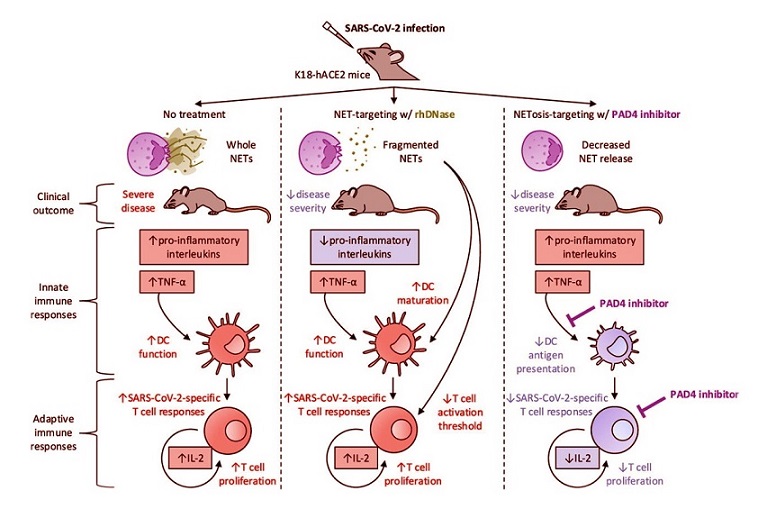Brazilian Researchers Find That PAD4 Inhibitors Could Weaken COVID-19 Immune Defense Despite Improving Symptoms
Nikhil Prasad Fact checked by:Thailand Medical News Team Apr 20, 2025 10 hours, 20 minutes ago
Medical News: A groundbreaking study by scientists from the Center for Research in Inflammatory Diseases at Ribeirão Preto Medical School, University of São Paulo in Brazil, in collaboration with researchers from the University of Glasgow and the University of Oxford, has revealed that targeting an enzyme called PAD4 might ease COVID-19 symptoms but could also dangerously weaken the body’s ability to fight the virus.
 Graphical Abstract: Brazilian Researchers Find That PAD4 Inhibitors Could Weaken COVID-19 Immune Defense Despite Improving Symptoms
Graphical Abstract: Brazilian Researchers Find That PAD4 Inhibitors Could Weaken COVID-19 Immune Defense Despite Improving Symptoms
The researchers focused on PAD4 (protein arginine deiminase 4), an enzyme responsible for forming neutrophil extracellular traps or NETs—web-like structures released by white blood cells to trap invading viruses. While NETs help the immune system, they can also cause severe lung damage in COVID-19.
Scientists have considered reducing NET formation as a potential treatment strategy. In this
Medical News report, however, the findings show a hidden danger in this approach.
PAD4 Inhibition and Reduced Lung Damage
Using a COVID-19 mouse model that mimics human disease, the team tested a PAD4 inhibitor known as GSK484. They found that, like the drug recombinant human DNase (rhDNase), which breaks down existing NETs, PAD4 inhibition significantly reduced NET levels in the lungs and improved physical symptoms such as weight loss and breathing difficulty. Importantly, both GSK484 and rhDNase were shown to lower lung inflammation and damage. But that’s where the similarities ended.
The Hidden Cost of Blocking PAD4
While rhDNase had no negative impact on the immune system's ability to recognize and fight the virus, PAD4 inhibition told a different story. The study showed that GSK484 reduced the activity of a critical group of immune cells known as dendritic cells. These cells are vital for initiating the adaptive immune response by showing viral fragments to T cells—cells that then multiply and destroy infected cells.
With fewer active dendritic cells and lower levels of IL-2 (a crucial signaling molecule that helps T cells grow), PAD4-inhibited mice had dramatically reduced numbers of virus-specific T cells. This included fewer CD4 and CD8 T cells, which are key to eliminating SARS-CoV-2. In short, while the lungs looked healthier, the immune system’s inner defenses were crippled.
Why This Matters for COVID-19 and Long-Term Protection
This imbalance raises serious questions about using PAD4 inhibitors like GSK484 in clinical settings. While these drugs may reduce lung injury caused by overactive immune responses, they also impair the very immune cells needed to eliminate the virus. The researchers emphasized the dual nature of immune responses in COVID-19—while strong T cell responses are crucial to clear the virus, they can also cause damage if not properly controlled.
The study als
o looked at PAD4 effects in a second model involving lung inflammation and found similar results: reduced antigen-specific T cell activation and proliferation. Additionally, lab experiments using human T cells confirmed that PAD4 inhibitors dampen T cell growth and IL-2 signaling without affecting cell survival or initial activation. This suggests that even in humans, PAD4 inhibition may carry similar immune-suppressing risks.
Conclusions and Cautionary Advice
The researchers conclude that while PAD4 inhibition might appear beneficial by reducing NET-related tissue damage and inflammation, it comes at a serious cost to adaptive immunity. Given how important T cell responses are for clearing the virus and preventing severe disease, any therapy that weakens this response could backfire, especially in patients with compromised immune systems.
They stress the importance of further studies—particularly into the use of PAD4 inhibitors in people suffering from long COVID, where immune dysregulation plays a key role. PAD4-targeted treatments must be carefully weighed and potentially combined with therapies that support or enhance T cell function to avoid making patients more vulnerable to the virus.
The study findings were published in the peer-reviewed journal: Mucosal Immunology.
https://www.sciencedirect.com/science/article/pii/S1933021925000443
For the latest COVID-19 News, keep on logging to Thailand
Medical News.
Read Also:
https://www.thailandmedical.news/news/covid-19-news-taiwanese-study-unravels-the-role-of-platelets-derived-micrornas-in-hyperactive-nets-formation-during-covid-19
https://www.thailandmedical.news/news/could-hyperactive-immune-cells-especially-the-neutrophils-be-the-reason-for-covid-19-fatalities
https://www.thailandmedical.news/news/researchers-using-machine-learning-to-calibrate-netosis-involved-in-inflammation-process
https://www.thailandmedical.news/pages/thailand_doctors_listings
https://www.thailandmedical.news/articles/hospital-news
Follow us on:
https://x.com/ThailandMedicaX
https://www.facebook.com/ThailandMedicalNews
https://bsky.app/profile/thailandmedical.bsky.social
https://gettr.com/user/thailandmedicalnews
https://www.tribel.com/thailandmedical/wall
and 33 other social media platforms
